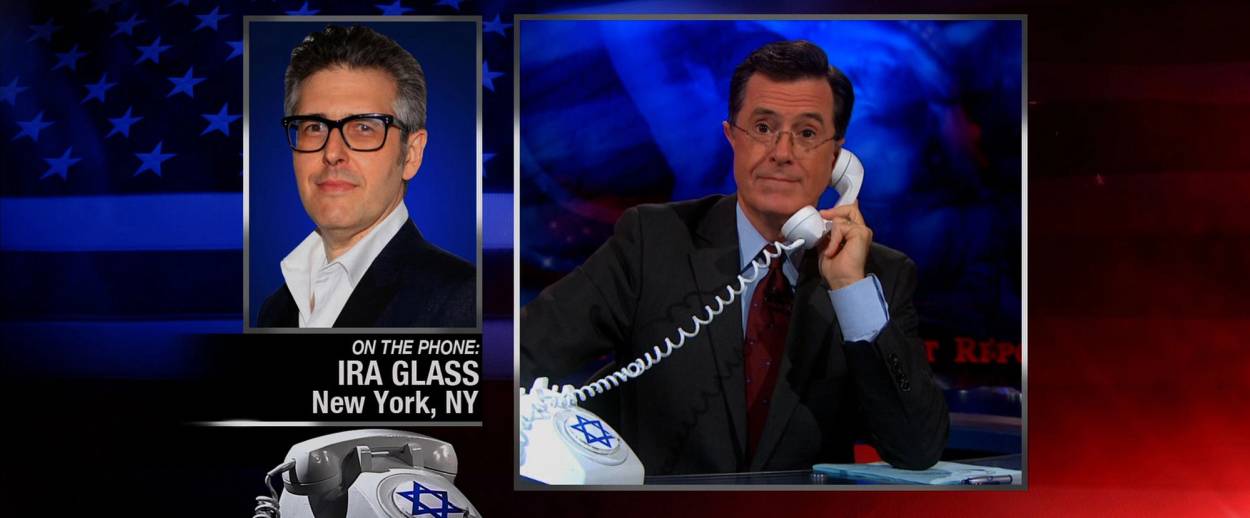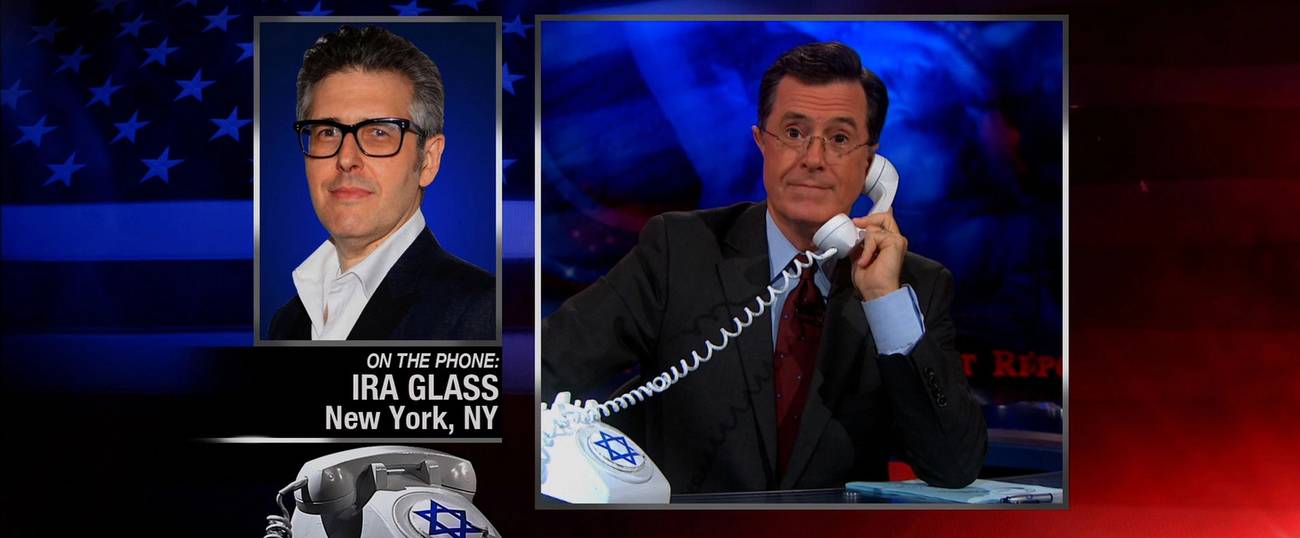The Gospel of Stephen Colbert
As the greatest exemplar of a person of faith in America today, the liberal Catholic host of ‘The Late Show’ is the best thing for Jews since lox




Stephen Colbert starts tonight as the host of The Late Show. I, for one, am excited to watch him play himself rather than his alter ego, the arch-conservative host of his previous late-night TV show The Colbert Report. What will he do when he’s freed from his bombastic, know-nothing, truthiness-loving persona?
He’s already our most important public intellectual: We’ve already seen Colbert authentically and publicly engage with his religion and beliefs and wrestle with the existence of evil in the world, despite the constraints of his “character.” And even though he’s not Jewish, he’s better for the Jews than Jon Stewart.
Let me backtrack. I think at this point we all know the story of Colbert’s early life: In 1974, when he was 10, his dad and two of his siblings died in a plane crash. When his mom passed away in 2013, he reflected on that time in his heartfelt, out-of-character eulogy. “She knew more than her share of tragedy, losing her brother and her husband and three of her sons,” he said on air, visibly struggling to keep it together. “But her love for her family and her faith in God somehow gave her the strength not only to go on, but to love life without bitterness, and to instill in all of us a gratitude for every day we have together. And I know it may sound greedy to want more days with a person who lived so long, but the fact that my mother was 92 does not diminish, and only magnifies, the enormity of the room whose door has now quietly shut.”
When his mother couldn’t recall her favorite color or what day it was, he said, she still knew and could recite her favorite prayer.
Her son seems made in her image. For Colbert, loss is inextricably tied to faith. Being able to joke and to wrestle with Catholicism is, for him, part of taking his faith seriously. “I love my church, and I’m a Catholic who was raised by intellectuals who were very devout,” he once said in an interview. “I was raised to believe that you could question the church and still be a Catholic. What is worthy of satire is the misuse of religion for destructive or political gains. That’s totally different from the Word, the blood, the body, and the Christ. His kingdom is not of this earth.”
He’s showed himself to be both super-knowledgeable about religion and super-willing to laugh at it. Who can forget his super-high-energy, Broadway-, aerobics- and ’80s-hip-hop-infused liturgical dance number? His recurring segment “Yahweh or No Way,” in which he decided which news stories were an insult to God and which ones God would approve of? (God did not approve of the Church’s new translation of Mass, about which Colbert said, “I don’t think I’m overstating it when I say this is the single biggest scandal ever to hit the Catholic Church. I certainly refuse to think of another.”)
As we approach the High Holidays, let us marvel at the beauty that was his annual “Atone Phone” segment, held every year since 2007 during the Days of Awe. As Colbert put it, “Traditionally this is a time to apologize to all those you have wronged. Now, I do not follow this tradition, because I am not Jewish and I have never been wrong.” Instead, he encouraged all the Jews who’d wronged him to call during the show. Each call was accompanied by a tinny “Hava Nagila” ringtone. (Jeff Tweedy, the rock star who’d recently converted to Judaism, called to apologize to Colbert for not inviting him to his bar mitzvah.) Colbert referred to our holiday as Rosh Hashashashashanah, and ate apples and honey and blew a shofar (poorly). “Mmm, it still tastes just as rammy as ever,” he noted. Fellow yehudim, I am sad to report that I just called 1-888-OOPS-JEW, and the Atone Phone has been disconnected.
For Colbert, Catholicism has always been tied to both social justice and liberalism. He testified before Congress about the plight of migrant workers, quoting Jesus’ words in Matthew 25:40: “Whatsoever you did for the least of my brothers, you did it to me.” He invited an activist nun, Sister Simone Campbell, onto his show, and when she appeared wearing a blue blouse and patterned skirt, sneered, “Where’s the outfit? Did you burn it at one of those wimple-burning parties you radical nuns hold?” (She noted that in history nuns wore the simple dress of the day, and today’s nuns have returned to simple dress because people found their oversized habits intimidating, and they want to walk among people as Jesus did.) Colbert-the-character disparaged her efforts on behalf of the disadvantaged, quoting Christian scripture at her: “The poor shall inherit the kingdom of heaven … so I need help more than a poor person does!” (He then quoted Jesus as saying, “I got mine, Jack.” I’m waiting to hear back from Tablet’s fact-checker about what book of the Christian Bible that’s in.) To prove his Catholic bona fides, in a segment called “The De-Deification of the American Faithscape!” he recited the entire Nicene Creed, the long profession of faith in Catholic liturgy.
And woe to any guest who tried to go head-to-head on theology with him. When Stanford psychologist Philip Zimbardo suggested that God was responsible for hell and for the existence of evil, Colbert snapped back immediately with the teachings of his tradition. “God gave Satan and the angels and man free will,” he said. “Hell was created by Satan’s disobedience to God, and his purposeful removal from God’s love—which is what hell is: removing yourself from God’s love. You send yourself to hell. God does not send you there.” Boom. And do you recall that “Better Know a District” segment with Representative Lynn Westmoreland? The congressman had sponsored a bill requiring the display of the Ten Commandments in the House and Senate because without them, the nation would “lose a sense of our direction.” Colbert then asked him to name the Ten Commandments. The congressman made it to three.
Colbert knows his own religion inside and out (he taught Sunday School in his church for many years) and is well-versed in other people’s, but he still believes in the separation of church and state. He has an embracing, kind, humanistic but eyes-wide-open view of both God and Catholicism. Jon Stewart, on the other hand, is more Jewy or Jew-ish than Jewish. Stewart reminds us that Judaism is a culture as well as a religion. His Jewishness is cultural and mensch-y, and his humor comes from a Borscht Belt tradition, but I suspect he’s not overly familiar with Jewish texts. He gets Hebrew and Yiddish words wrong. I could so take him in a Bracha Bee.
What I most love about Colbert-the-person-of-faith is that he is an intellectual who chooses to believe in things that can’t be proven. Jesus’ suffering tells him how to approach life. After his mother died, he told the New York Times, “She taught me to be grateful for my life regardless of what that entailed, and that’s directly related to the image of Christ on the cross and the example of sacrifice that he gave us. What she taught me is that the deliverance God offers you from pain is not no pain—it’s that the pain is actually a gift. What’s the option? God doesn’t really give you another choice.”
Last month there was a gorgeous profile of Colbert in GQ. I urge you to read it, but one detail that stayed with me is the fact that Colbert used to have a note taped to his computer that read, “Joy is the most infallible sign of the existence of God.” And indeed, in a world that makes so many of us feel so bitter and so hopeless so often, how marvelous that we’re going to have an influential network TV show hosted by someone who is joyful, as well as smart, well-read, and tolerant. I can think of other late-night hosts who are a few of these things. I can think of none who are all of them.
Like Bruce Banner, I’m always angry. So I’m excited to watch Colbert’s new show knowing that he is not like me. “I’m not angry,” he told GQ. “I’m not. I’m mystified, I’ll tell you that. But I’m not angry.” The reporter noted the depths in the way Colbert uttered the word “mystified.”
We all know that people of faith are generally stereotyped as politically conservative. But a 2013 survey of 2,002 Americans by the Public Religion Research Institute found that one in five Americans could be classified as a religious progressive. Colbert would be one of them, connected to his faith tradition, but with a theological and social outlook that’s liberal rather than conservative. The survey found that among millennials, religious progressives actually outnumber religious conservatives. And religious progressives are more passionate than other liberals about correcting income inequalities and helping the poor. To me, that’s inspiring. I suspect that religious progressives are also more willing to engage with others of different faiths—and of no religious faith at all—in acts of tikkun olam, healing the world. Colbert is already doing that. Rolling Stone said, “It’s a toss-up between Stephen and Pope Francis for Best Catholic Rebrander of the 21st Century.” But I think his virtue is much greater even than that.
***
Like this article? Sign up for our Daily Digest to get Tablet Magazine’s new content in your inbox each morning.
Marjorie Ingall is a former columnist for Tablet, the author of Mamaleh Knows Best, and a frequent contributor to the New York Times Book Review.